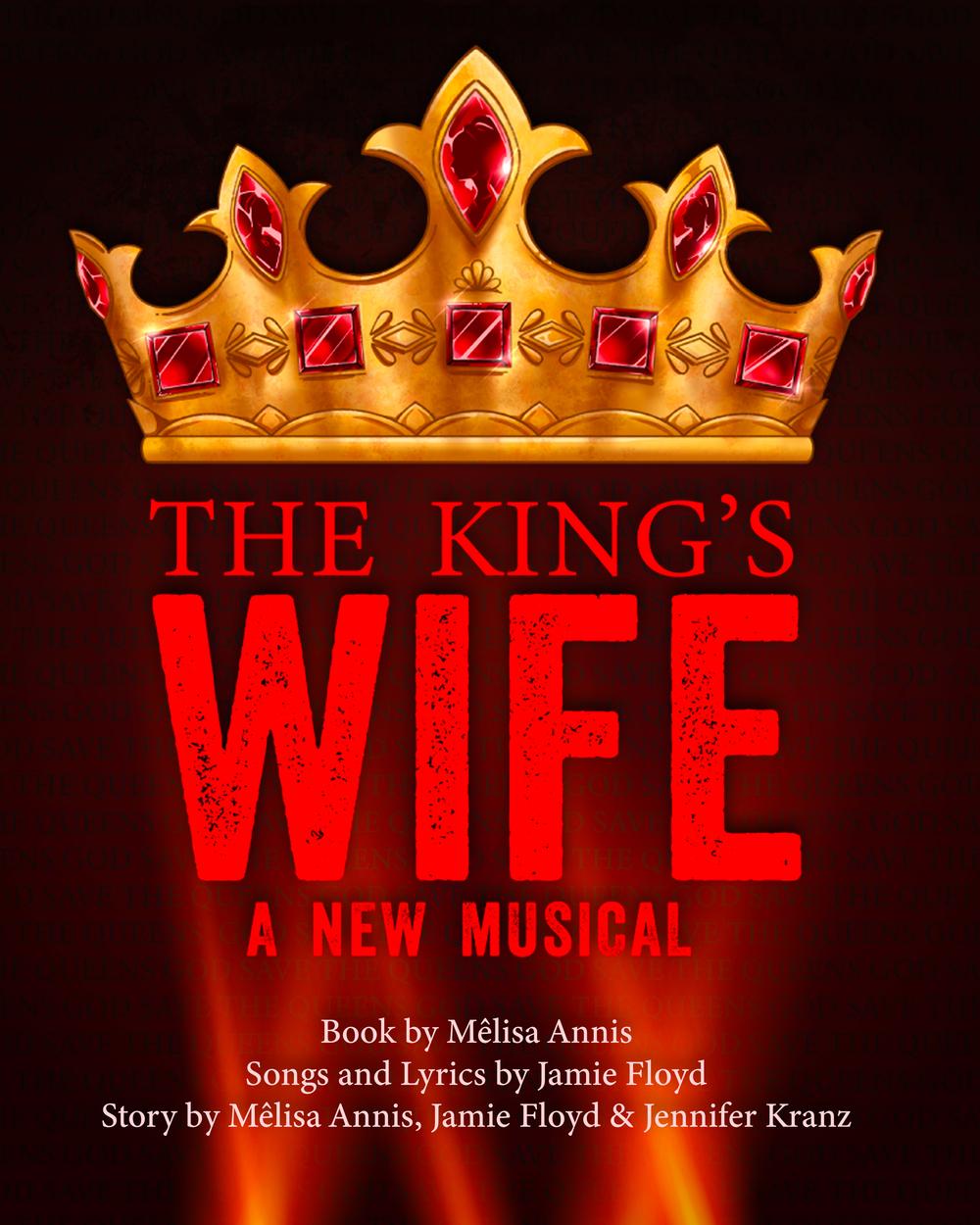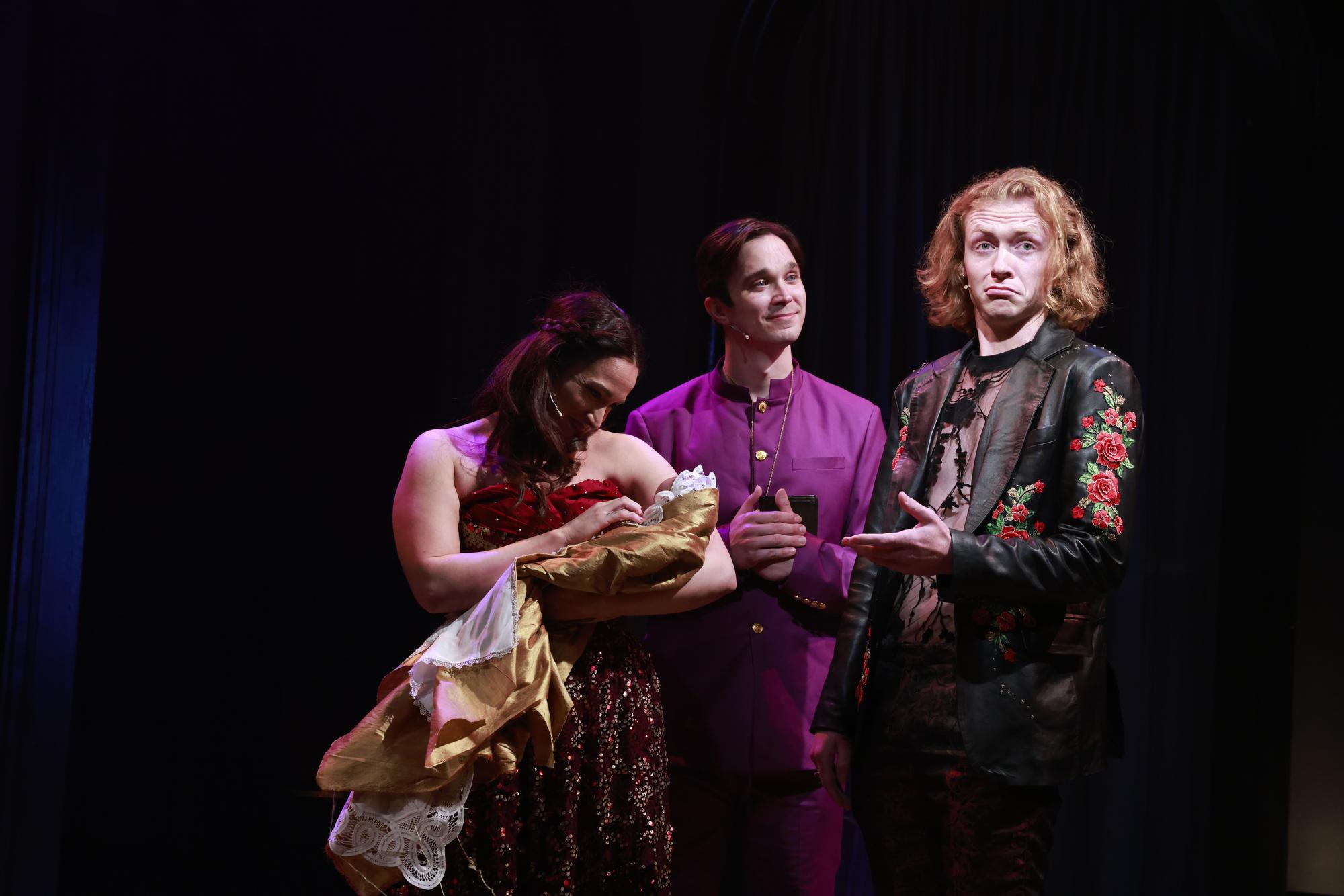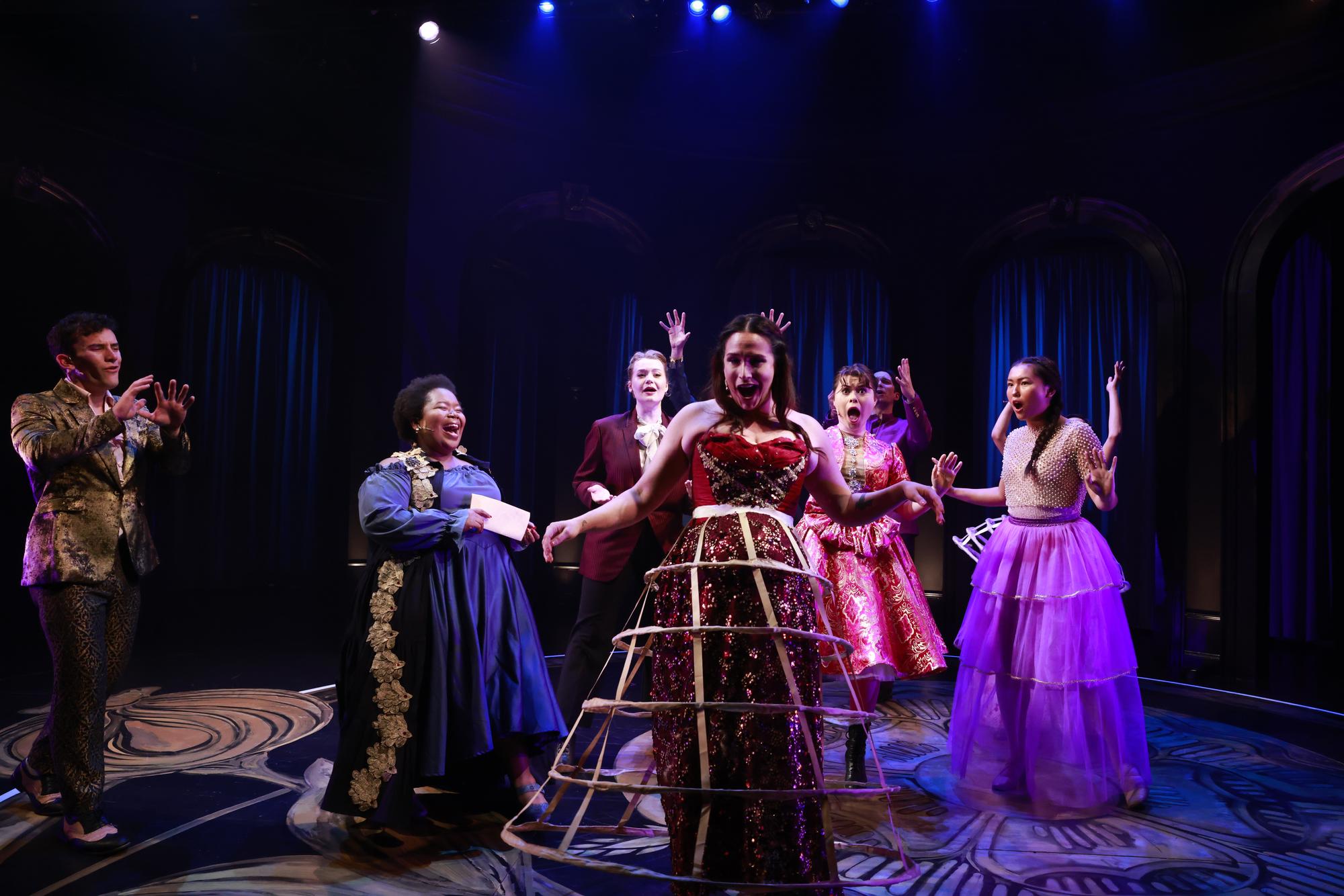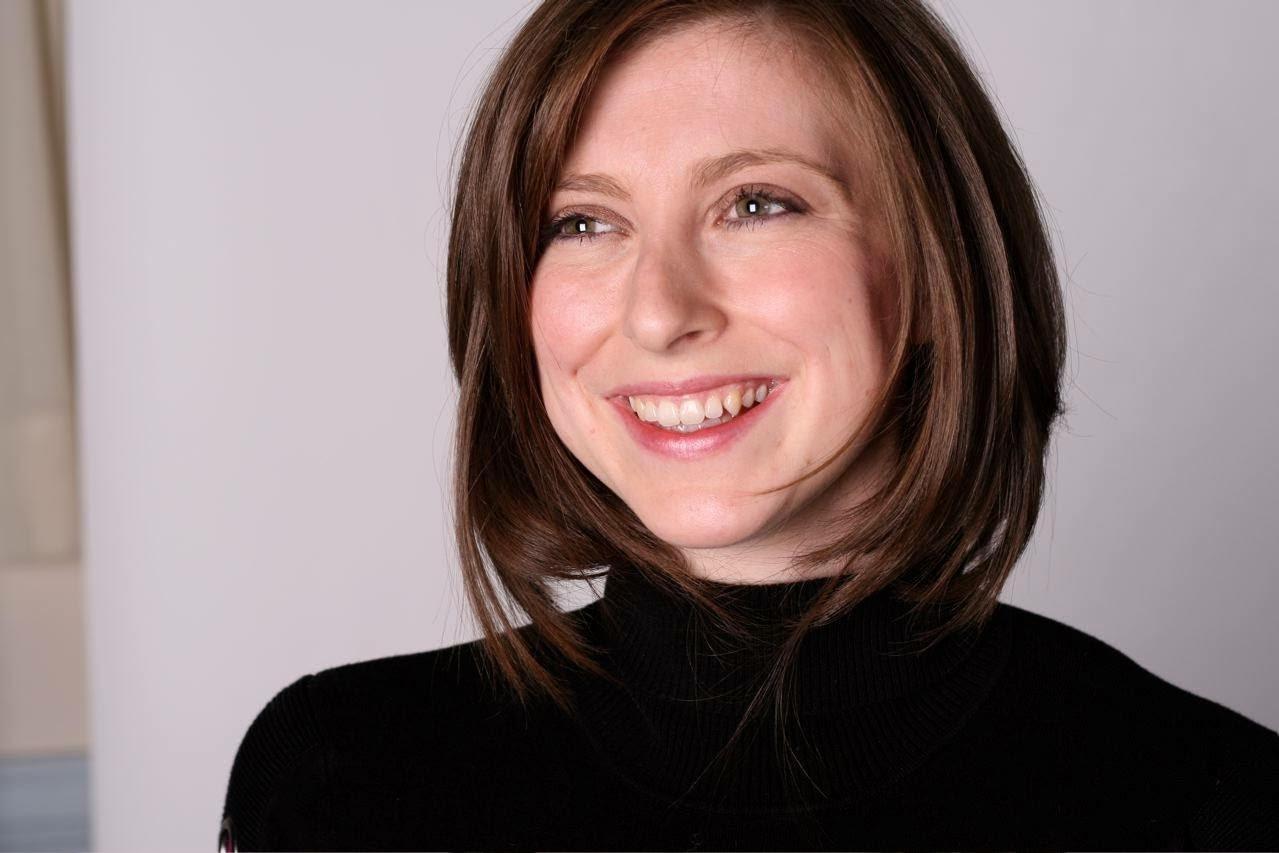Note: This conversation has been condensed and edited for clarity.
“The King’s Wife,” a new musical about Catherine of Aragon, the first wife of King Henry VIII of England, premiered June 13 at Constellation Stage and Screen in Bloomington. The Indiana Daily Student spoke with Mêlisa Annis, one of the writers of the show, ahead of its debut.
Annis is a Welsh playwright and director who also serves as an adjunct instructor at New York University. She received a True West Award as the lead writer on “Of Spacious Skies” a radio play series put on by Colorado College.

Sydney Weber: To get started, can you tell me a little bit about why you went with the story of Catherine of Aragon for the musical?
Annis: The interesting thing is, I think it’s easy to think that we’re just telling another Tudor story. Right? There have been so many Tudor tales over the years. There’s all of these other things, but I do feel a little bit like Catherine of Aragon gets short shrift. Partly because of course, she was the first wife, and she was erased almost completely from the history book because he (Henry VIII) needed to get rid of her so that he could move on. But people forget that, actually, they were married for over 20 years.
And so even though the majority of our fascination is with Anne Boleyn and with all of the horrific deeds that he did — you know, the murder of the women after that — people forget that actually, there was 20 years of his life that he was with this one woman. And so, a part of the story that we’re telling is: in that 20 years, who were they to each other at the beginning of that time? And then again at the end of that time that they had with each other? So, in 100 minutes, we’re spanning two decades. As you can imagine, only musical theater can do something like that.
Although we are using Catherine of Aragon as the vehicle to tell this story, we are using essentially the archetype of familiar faces to reflect on our own society today. So, although it is the story of Catherine of Aragon, and we do have Anne Boleyn entering the court, and of course we have the king and all the things, trappings, that come with the Tudor court, we are essentially looking at history through this musical reimagining of the story of Catherine of Aragon, so that we can look at who we are today. (We’re) using those archetypes to try and raise the mirror to some of the problems we have in society, still, even though it’s however many hundreds of years later, right?
And then, of course, in our show, one of the things that was very important to us is that our story is about the women that we never hear about, as opposed to the king that they share. So, they get to take center stage and tell their own stories of power, ambition, sisterhood, heartbreak, hope, all of that sort of stuff, you know?

Jeremy Hogan
Emma Hunton (left) and Ricky Moyer (right) star as Catherine of Aragon and Henry VIII in "The King's Wife" at Constellation Stage and Screen. The musical explores how Henry VIII's decision to divorce Catherine of Aragon affected her and resulted in the creation of the Church of England.Weber: Some of those problems of modern times that you alluded to are reflected in the story. What are some of those that you were thinking about during development?
Annis: Well, I think that as an artist, our job is to constantly have our satellite dishes open, our ears open, to what’s happening, and sometimes we’re not even aware of what we’re writing until we’re writing it. And so, it’s been actually very, very interesting to constantly be developing this piece — because we've been developing it now over seven years, more or less.
And so, things have come in and out of the musical, but the core of it remains, and that is that sometimes the smartest person in the room is a woman, and she doesn't get the job. She gets the job done, but she doesn’t get the job, because she's not a man. So that essentially is a big core part of our story, which is: What is it about this sharing of power, this equitable power, that we struggle with so much? That women are just not getting a portion of the pie? Because it’s not their brains, it’s not anything else other than choices that society makes to say 'no, no, no, no, you don’t get a right to be at the biggest table’.
And so, it sort of looks at: Well, why is that? And why is it even as far back as 1513, that the most extraordinary woman, from a dynasty of extraordinary people who did extraordinary things in Spain, comes to England and essentially is not only sidelined but erased from much of our history? And so, that is a big, big part of the story.
And then, of course, there is this idea of, you know, how society treats the female body and freedom of choice. And so, Anne Boleyn comes in with ideas that she can have some sort of freedom of choice. And then she quickly realizes, ‘Oh, we are here,’ for lack of a better word, ‘to birth an heir. That is my role. And if I want to move forward in my role, I have to achieve this one thing, that I have no power or control over, to give a male heir, to have a voice.’ And so, it all comes back to this idea of: Gosh, why is it one rule for one and another for another? It just, you know, it’s the constant question that we as women ask, I think in society: Why can’t we all play by the same rules?

Jeremy Hogan
Isabel Barredo dances in a scene from "The King's Wife" which is currently performing at Constellation Stage and Screen. In the musical, Barredo's character is sent to France as a diplomat.Weber: You mentioned that development of this has taken seven years. What has that process looked like?
Annis: Well, there’s a lot of heartbreak. I actually wrote the script first. I wrote the play of it first, and then our producer Jennifer Kranz with Rosalind Productions, she discovered Jamie’s work. Jamie Floyd is a Nashville writer. She writes a lot of great songs for a lot of great people. What Jamie does so beautifully is she’s a wonderful storyteller, but she also captures the emotion of a moment so beautifully, and with a hook. So, we discovered that, gosh, we can really push this feeling of a contemporary retelling of a story using Jamie’s superpower, which is pulling at the heartstrings.
Jamie and I really just kind of spoke to each other about ‘Well, what are the things that are important to us, for us to say?’ And Jamie and I are very, very different women. You couldn't get two more different people if you tried it, she and I. And yet we came together on this feeling of, we both know what it is to be marginalized in rooms. We both know what it is to try and have to speak up for ourselves when others perhaps have a much louder voice and can step on ours. So, we have these similar experiences, and we just basically played in the sandbox from there on.
With us working with each other for a little while, the pandemic hit, and that was very hard because I was in New York City and she was in Nashville. We experienced being separate and writing a musical when you're that far away from each other and when you think the world is coming to an end. Our respective industries closed down, hers being music and mine of course being theater; it was just a very troubling time. And so, we really had to reassess once we sort of came back together: ‘Who are we now?’ Because who we were pre the pandemic and who we were post the pandemic had shifted.
And then we looked at the script and we thought: ‘Well, that is exactly what these characters have gone through.’ Huge shifts, you know, in their lives and huge traumas that they’re expected to just move forward regardless. But actually, the world shifts with these major events. And so, there’s one moment in the first act, where Catherine of Aragon is — not to give too much away — but she is pregnant with her fifth child, and she still hasn’t produced a male heir for the king. Of course, she has a beautiful young daughter who’s perfectly capable of taking over the throne, but she doesn’t count. So, she’s pregnant, she’s late in her 30s at this point and she thinks that she probably won’t make it through this last birthing.

Jeremy Hogan
Emma Hunton (left), Andrew Keeler (center) and Ricky Moyer (right) act in a scene from "The King's Wife" at Constellation Stage and Screen. The musical explores Henry VIII's attempts to produce a male heir which creates tension between him and the musical's main character, Catherine of Aragon.And so that moment in the musical became so clear to us that ‘That’s the shift in the show.’ And so, we start at the beginning of the show in this crazy Tudor romp, where it’s almost cartoon-like. The archetypes are at their fullest at the top of the show. And then at this final loss of her final child, everything shifts, as if the reality hits. The world has changed, and it’s almost like we go into a sort of, for lack of a better word, almost like a grayscale version of the show, where they’re all trying to figure out, how do they move forward from this moment?
Our first reading was at Playwrights Horizons in New York City, and then we were lucky enough to be able to go to the Adirondack Theatre Festival, after that. We had four performances with three glorious days there of sold-out performances of another reading, which taught us so much about what we were doing. Every time we have an audience, we learn so much. And then we were at Paramount just a couple of months ago just outside of Chicago, in Aurora, Illinois, where we learnt again with a new cast. And just being with Constellation in Bloomington for the last week has been the biggest growing experience for the show, because now we’re finally staging it for the first time. And anybody of your readers who is a playwright, or musical theater writer, will know that you don't know anything until you have bodies on stage, moving around. And so, Jamie and I have been deep in rewrites every day this week. And we’re so grateful for Constellation to give us this opportunity to play, form and to learn from your audiences here in Indiana.
Weber: How did it come about that it was going to be at Constellation and Bloomington, Indiana for the world premiere of this musical?
Annis: Well, you guys have a great theater here. I think that there’s this very elitist idea that theater only happens in New York City, and maybe occasionally in Atlanta and California and of course, Canada. We don’t want to have polarized audiences, right? And it’s so helpful to actually take a story around, like the old troubadours used to do back in the day, to take a story around and see what’s resonating with different audiences. And you here in Bloomington, have such a great variety of audiences.

Jeremy Hogan
Namisa Bizana, Lauren Drewello, Emma Hunton, Kayla Christina Quiroz, Andrew Keeler and Laura Rong act in a scene from "The King's Wife." The musical, which opened at Constellation Stage and Screen June 5, highlights the women of Tudor England and the roles they played in society.So just looking at Constellation, you know, they're challenging people; they're putting entertaining stories out there, as well as putting new ideas, putting new plays out there. And developing new plays and developing new musicals is a difficult, difficult thing to do. Trust me, you don’t do it for the money. And so, when Constellation approached us because we had said we had won the Woodward Newman Prize for the script, when they approached us to do the first production, we just thought: ‘Yes, that’s exactly what we need to do. We need to learn.’ Chad, the artistic director, has been fantastic with giving us thoughts and notes and helping us realize this dream. It was one of those things where all of the pieces came together at the right place at the right time. And that place happened to be Bloomington, Indiana. And so, it’s great for me as a woman from Wales who has never been to Indiana; I get to experience a whole new part of the country, which is lovely.
Weber: Is there any way in which you can see how your background as a Welsh woman has really influenced how the show came about or what it’s like?
Annis: I think that politics is a very complicated thing, right? And international politics are very complicated. However, when a producer came to me with this idea, the one thing I knew I had in bucket loads was experience of being around the Tudors. Being born in Britain, you know, we’re surrounded by castles. It’s a big part of our history. Everyone goes to Hampton Court on a school trip, and I’ve probably been there six times at this point.
Our whole show is actually set in the Great Hall. And the way that we've staged all the scenes because, as you know, being in the Great Hall, there’s all those eavesdroppers. There’s always people listening. And there are doorways everywhere. It really has that feeling of ‘you can't have any private moments.’ There’s someone listening at all times. And that was something that I really discovered in Hampton Court recently when I was there last year. Again, that it was a very exciting thing, to never know who’s listening.
But to go back to your question, we are surrounded by Tudor history in Britain. And so that was a very easy thing for me to plug into as a person. But I also have a bittersweet connection with the Tudors too, because I am Welsh and they were Welsh. They were the last reigning Welsh royal family that have been on the throne.
But I think that that connection at least allowed me to think, as a Welsh person who’s always felt somewhat colonized by the English, ‘What is it to feel that precarious insecurity of: I need to secure something to prove my worthiness?’ And so, I really, really identified with that feeling, weirdly, that Henry had, of ‘I need a son because I need an heir to continue the legitimacy of my life.’ And I think sometimes as a minority culture, you're constantly trying to prove yourself. And sometimes we do stupid things and sometimes we do great things, but sometimes we do stupid things just to say, ‘Hey, I’m worthy.’ And so that really spoke to me.

Courtesy Photo
Mêlisa Annis, the bookwriter of ‘The King’s Wife’ is pictured.But ultimately, what I was really interested in is once I sort of dove into the story of Catherine of Aragon, was this woman who was born in a family that essentially ended up colonizing the world. And the power that she had coming to England, which was a teeny tiny little country that was not yet an empire and did not become an empire until Elizabeth the First, essentially. And so, just sort of this idea of these extraordinary women from these extraordinary, powerful places that have been put into, you know, big hoopskirts and caged and put into corners. When actually, we need to remember that they were a big part of the history of not only America, but other countries, too, be it good or bad, because it’s very complicated. Just like I said, with my history of the Tudors, it’s very complicated, but it is endlessly fascinating. And I think that’s why the story remains, is because it is just endlessly fascinating to think, ‘Gosh, we are repeating so many of the same things in the past. Why? Why is that?’
Like what you're reading?
Support independent, award-winning student journalism.
Donate.